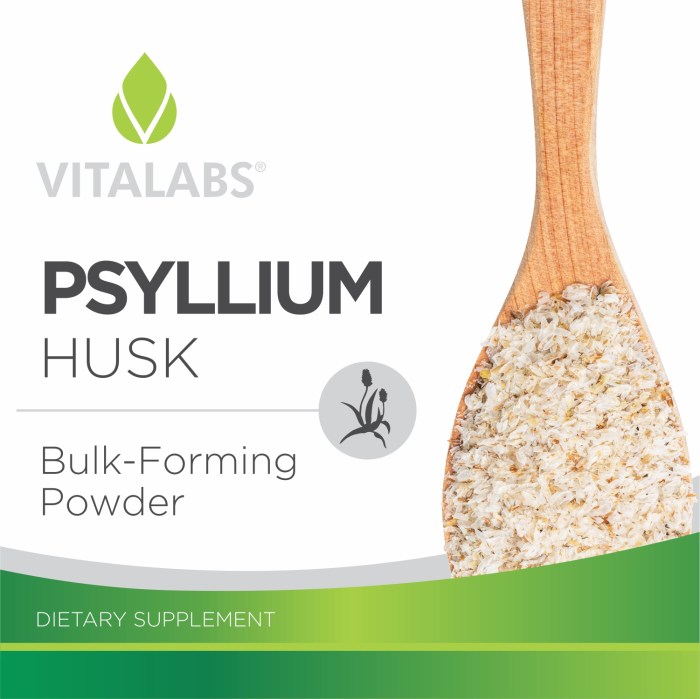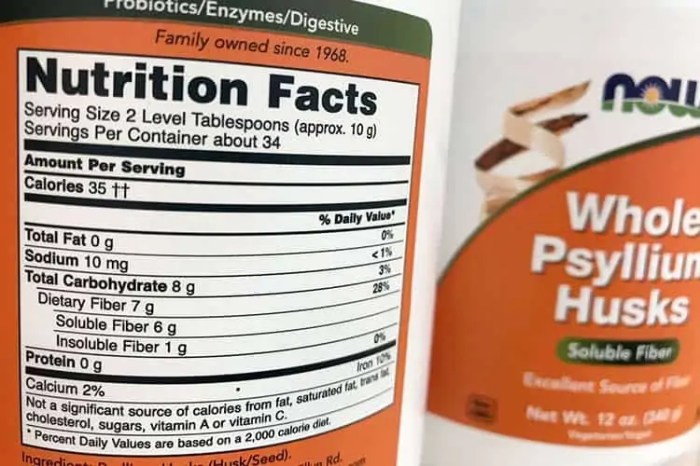Nutritional Composition of Psyllium Husk Powder

Psyllium husk powder nutrition facts – Psyllium husk powder, a superfood straight from the heart of Bali’s vibrant nature, offers a nutritional punch that’s as refreshing as a coconut water on a hot day. Let’s dive into the details of what makes this humble powder so powerful. Think of it as your secret weapon for a healthier, happier you.
Macronutrient Profile of Psyllium Husk Powder, Psyllium husk powder nutrition facts
Psyllium husk powder is primarily known for its impressive fiber content, but it also contains small amounts of other macronutrients. The following table provides a typical nutritional breakdown per serving (usually around 1 tablespoon or 7 grams), though this can vary depending on the brand and processing. Remember, these are averages – always check the specific nutritional information on your chosen product.
| Nutrient | Amount per serving (grams) | % Daily Value | Notes |
|---|---|---|---|
| Carbohydrates | ~2-3 | ~1-2% | Mostly from fiber; minimal sugar content. |
| Fiber (Total) | ~3-4 | ~10-15% | High in both soluble and insoluble fiber. |
| Fiber (Soluble) | ~1-2 | Variable | Forms a gel-like substance in the gut, aiding digestion. |
| Fiber (Insoluble) | ~2-3 | Variable | Adds bulk to the stool, promoting regularity. |
| Protein | ~0.5-1 | ~1-2% | A relatively minor source of protein. |
| Fat | ~0 | ~0% | Negligible fat content. |
Micronutrient Content of Psyllium Husk Powder
While not a primary source of vitamins and minerals, psyllium husk powder does contain trace amounts of several essential nutrients. The quantities can fluctuate based on soil conditions and processing methods.
Psyllium husk powder, a curious fiber, boasts a surprisingly high content of soluble fiber. Its nutritional profile, however, pales in comparison to the seemingly innocuous turkey lunch meat; for a contrasting perspective, check the detailed nutrition facts for turkey lunch meat to see the stark differences. Returning to psyllium husk, its subtle yet powerful effects on digestion remain a subject of ongoing fascination, hinting at secrets yet to be uncovered.
Psyllium husk powder generally contains small amounts of:
- Magnesium
- Potassium
- Manganese
- Various B vitamins (in trace amounts)
Bioactive Compounds and Phytochemicals in Psyllium Husk Powder
Beyond its macronutrient and micronutrient profile, psyllium husk powder boasts several bioactive compounds that contribute to its potential health benefits. These naturally occurring substances work synergistically to support overall well-being.
Key bioactive compounds include:
- Plant Mucilage: This is the primary component responsible for psyllium’s fiber content and its ability to absorb water, forming a gel-like substance in the digestive tract. This helps regulate bowel movements and can contribute to feelings of fullness, potentially aiding in weight management. Think of it as nature’s gentle cleanser.
- Polyphenols: These antioxidants help protect cells from damage caused by free radicals. This contributes to overall cellular health and may play a role in reducing the risk of chronic diseases.
Psyllium Husk Powder in Different Food Preparations
So, you’re ready to embrace the amazing benefits of psyllium husk powder? Fantastic! This magical ingredient, straight from the heart of Bali’s vibrant nature (okay, maybe notliterally* Bali, but it feels that way!), isn’t just about fiber; it’s about adding a healthy boost to your daily eats without compromising on taste. Let’s explore how to seamlessly incorporate this powerhouse into your favorite dishes.Psyllium husk powder’s subtle flavor and ability to absorb liquids make it incredibly versatile in the kitchen.
It can thicken, add texture, and boost the nutritional value of a wide array of dishes, from smoothies to baked goods. Think of it as your secret weapon for healthier, happier eating!
Incorporating Psyllium Husk Powder into Various Recipes
Adding psyllium husk powder to your meals is easier than you think. A little goes a long way, so start with small amounts and adjust to your preference. Remember to always drink plenty of water when consuming psyllium husk powder to prevent any digestive discomfort.
- Smoothies: A teaspoon or two blended into your favorite smoothie adds a significant fiber boost, creating a thicker, creamier texture. Try it with mango, banana, and coconut milk for a tropical treat!
- Baked Goods: Psyllium husk powder can replace some of the flour in recipes like muffins, cakes, and breads, adding moisture and improving the overall texture. It also contributes to a slightly denser crumb. A good starting point is to substitute 1-2 tablespoons of flour per cup.
- Soups: For a subtly thicker, more satisfying soup, add a teaspoon or two of psyllium husk powder towards the end of cooking. Stir well and let it sit for a few minutes to absorb the liquid.
A Simple Psyllium Husk Banana Muffin Recipe
This recipe showcases the versatility of psyllium husk powder in a delicious and easy-to-make muffin. The subtle flavor blends perfectly with the sweetness of bananas, creating a moist and healthy treat. Ingredients:* 1 ½ cups all-purpose flour
- ½ cup psyllium husk powder
- 1 teaspoon baking soda
- ½ teaspoon baking powder
- ½ teaspoon salt
- ½ cup brown sugar
- 3 ripe bananas, mashed
- ¼ cup vegetable oil
- 1 teaspoon vanilla extract
- 1 cup milk (dairy or non-dairy)
Instructions:
- Preheat oven to 375°F (190°C). Line a muffin tin with paper liners.
- In a large bowl, whisk together flour, psyllium husk powder, baking soda, baking powder, and salt.
- In a separate bowl, combine mashed bananas, brown sugar, oil, and vanilla extract.
- Gradually add the wet ingredients to the dry ingredients, mixing until just combined. Do not overmix.
- Stir in the milk until the batter is smooth.
- Fill muffin cups about ¾ full.
- Bake for 18-20 minutes, or until a toothpick inserted into the center comes out clean.
- Let cool in the muffin tin for a few minutes before transferring to a wire rack to cool completely.
Banana Muffin Image Description
Imagine a perfectly golden-brown muffin, slightly domed on top, with a delicate, slightly crumbly texture. The color is a warm, inviting beige, speckled with tiny brown flecks from the psyllium husk powder subtly interwoven into the banana-infused batter. The muffin’s surface has a gentle, almost velvety appearance, suggesting a moist and tender crumb inside. The aroma is sweet and faintly spiced, hinting at the delicious banana flavor within.
It looks utterly irresistible and perfectly portioned for a healthy and delightful snack.
Comparison with Other Fiber Sources

So, you’re digging into the world of fiber, huh? Good on ya! Psyllium husk is a total rockstar, but let’s compare it to some other popular fiber sources, shall we? Think of it like comparing different surfboards – each one’s got its own vibe and best use.This table breaks down the nutritional profile and health benefits of psyllium husk powder alongside oat bran, chia seeds, and flaxseed.
We’ll highlight where psyllium husk shines and where the others excel, keeping it real Bali-style.
Fiber Source Comparison Table
| Fiber Source | Fiber Type | Health Benefits | Potential Drawbacks |
|---|---|---|---|
| Psyllium Husk Powder | Mostly soluble fiber (hemicellulose) | Excellent for digestive regularity, cholesterol lowering, blood sugar control. Forms a gel-like substance in the gut, promoting satiety. | Can cause bloating or gas if not introduced gradually. Requires sufficient water intake. May interact with certain medications. |
| Oat Bran | Both soluble and insoluble fiber (beta-glucan, cellulose) | Helps lower cholesterol, improves blood sugar control, promotes satiety. Good source of other nutrients like magnesium and B vitamins. | Can be less effective for bowel regularity compared to psyllium husk. May not be as readily available as other options. |
| Chia Seeds | Both soluble and insoluble fiber | Excellent source of omega-3 fatty acids, antioxidants, and various minerals. Supports digestive health and can help with weight management. | Can be expensive. Requires adequate hydration to avoid digestive discomfort. May have a slightly gritty texture. |
| Flaxseed | Both soluble and insoluble fiber (lignans) | Rich in omega-3 fatty acids, lignans (plant compounds with potential health benefits), and fiber. Supports heart health and may help with hormone balance. | Can have a strong flavor that may not appeal to everyone. Requires grinding for optimal nutrient absorption. May interact with certain medications. |
FAQs: Psyllium Husk Powder Nutrition Facts
Is psyllium husk powder safe for everyone?
While generally safe, psyllium husk powder may not be suitable for individuals with certain conditions like bowel obstructions or esophageal strictures. Always consult a doctor before using it, especially if you have pre-existing health issues.
How much psyllium husk powder should I consume daily?
Recommended dosages vary, but typically start with a small amount (e.g., 1-2 teaspoons) and gradually increase as tolerated. Always follow product instructions and drink plenty of water.
Can I take psyllium husk powder with medication?
Psyllium husk can potentially interfere with the absorption of some medications. Consult your doctor or pharmacist to ensure it’s safe to take with any prescription or over-the-counter drugs.
What if I experience side effects like bloating or gas?
Bloating and gas are common side effects, often due to insufficient water intake. Increase your water consumption and gradually reduce the amount of psyllium husk powder you consume. If symptoms persist, discontinue use and consult your doctor.
